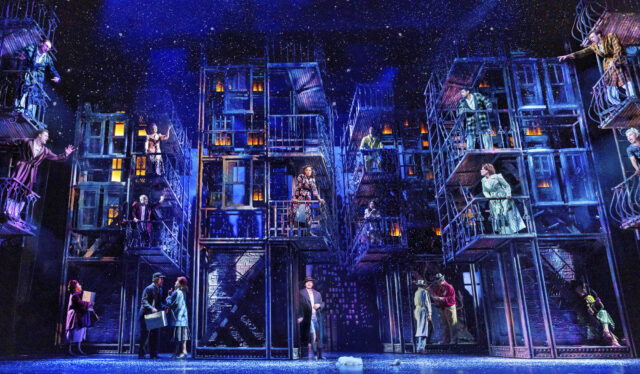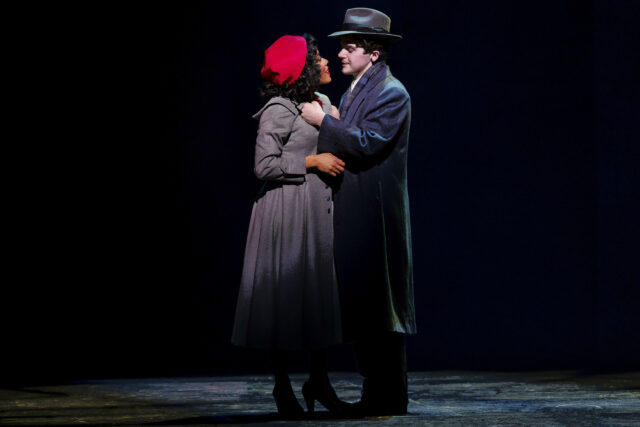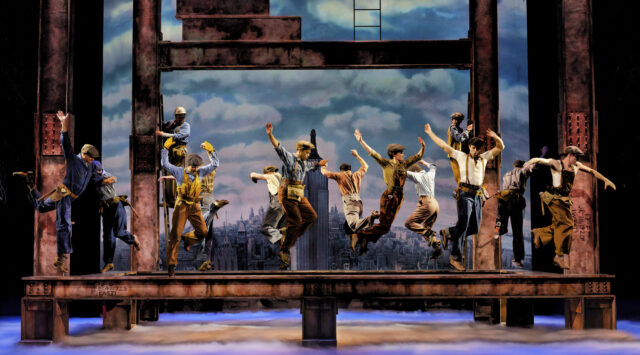
Beowulf Boritt’s New York, New York set is best thing about new musical (photo by Paul Kolnik)
NEW YORK, NEW YORK
St. James Theatre
246 West 44th St. between Broadway & Eighth Aves.
Tuesday – Sunday through July 30, $49-$259
newyorknewyorkbroadway.com
Start spreading the news: You’re not going to want to be a part of this.
The new Broadway musical New York, New York is a mostly tone-deaf tale inspired by Martin Scorsese’s 1977 flop, in which Robert De Niro starred as troubled sax man Jimmy Doyle and Liza Minnelli played the object of his affections, singer and actress Francine Evans. David Thompson and Sharon Washington’s book for the musical is built on the mere shell of that plot, and they proceed to craft a supremely dull love story as the two protagonists seek success in the big city, with or without each other. The whole mess feels like one giant excuse to feature the massively popular title song in a show, teasing the tune early before blasting it out in a fantastical grand finale.
World War II has just ended, and Colton Ryan is Jimmy, an Irish piano player known as Kid Wonder who keeps losing jobs because he can’t control himself (or his drinking). Anna Uzele is Francine, a Black singer from Philadelphia who was a USO star during the war, now looking to make a brand-new start of it in old New York. It’s love at first sight for Jimmy but not for Francine, who wants to prove herself on her own. Jimmy’s best friend is Tommy Caggiano (Clyde Alves), who provides comic relief as a tough-talking Italian with a heart of gold. “Listen, New York City is the greatest social experiment ever,” Tommy tells Francine upon meeting her. “Everybody lives here. And everybody’s natural enemy lives here. And we manage not to kill each other. For the most part.”
Jimmy cuts in, “Tommy, Tommy, let me. New York is a major chord! Not like Philly. That’s a minor chord. A major chord is when everything in your life works out perfectly. When you have everything in the right order. One is music. Two is money. And three is love.” Unfortunately, that weak metaphor comes back to haunt us later.

Francine Evans (Anna Uzele) and Jimmy Doyle (Colton Ryan) search for love in Broadway musical inspired by film (photo by Paul Kolnik)
Thompson and Washington populate this social experiment with a diverse mix of minor characters attempting to build, or rebuild, their lives in postwar 1946 New York City. Mateo Diaz (Angel Sigala) is a gay Cuban bongo player whose mother, Sofia (Janet Dacal), is abused by her always-angry husband, Luis (Leo Moctezuma), who carries a baseball bat with him wherever he goes. Jesse Webb (John Clay III) is a Black soldier and trumpet player who can’t find a music gig because of his race. Alex Mann (Oliver Prose) is a young Polish violinist desperate to study with master teacher Madame Veltri (Emily Skinner), whose son is missing in action. And Gordon Kendrick (Ben Davis) is a wealthy British producer who is interested in Francine, but not just for her vocal talent.
“Little dreams, little life. Big dreams, big life,” Francine tells Jimmy, speaking for all the people pouring into the melting pot that is New York, trying to better their lives but too often trapped by racism, classism, and misogyny.
New York, New York has big dreams itself, but it meanders all over the place. Lexington, Kentucky, native Ryan (Girl from the North Country, Dear Evan Hansen) is unconvincing as a New York jazzman and has no chemistry with Uzele (Six, Once on This Island), who lights up the stage when she sings, belting out “But the World Goes ’Round” and reminding us that Minnelli’s version of the title track is far superior to Frank Sinatra’s. An exceptional Jim Borstelmann (Chicago, The Producers) wins the hearts of the audience in multiple roles, from newspaper vendor to bassist. Tony nominee Skinner (Side Show, Billy Elliot) beautifully portrays the heartbroken violin virtuoso, but the other characters are lost in stereotypical, uninteresting plot devices.

Dance scene atop construction I-beam is highlight of New York, New York (photo by Paul Kolnik)
However, the show looks fantastic; Beowulf Boritt’s set ranges from clubs, Times Square, and a radio station to streets and alleyways laden with low-rent apartments and fire escapes; a highlight is a dance performed on a construction I-beam that references the famous photo “Lunch atop a Skyscraper,” in which eleven construction workers enjoy a break sitting on a beam that appears to be floating above the city.
Susan Stroman’s (POTUS, Crazy for You) direction and choreography are surprisingly inconsistent, either lackluster or over the top. That lack of consistency extends to Sam Davis’s arrangements, Davis and Daryl Waters’s orchestrations, and Alvin Hough Jr.’s music direction, which is not surprising given how many hands stirred this melting pot, with songs by John Kander, Kander and Fred Ebb (who passed away in 2004), Kander and Lin-Manuel Miranda, and Kander, Ebb, and Miranda.
Ken Billington’s lighting and Kai Harada’s sound make sure we stay awake, while Boritt and Christopher Ash’s projections add to the metropolitan vibe, although a scene involving what is now known as Manhattanhenge feels anachronistic.
In the film, “Happy Endings” is a fantasy sequence, but in the show it is a tired trope; the actual ending onstage is a different kind of fantasy, meant to melt away those little town blues, but, like too much of this musical, it just burns credulity.